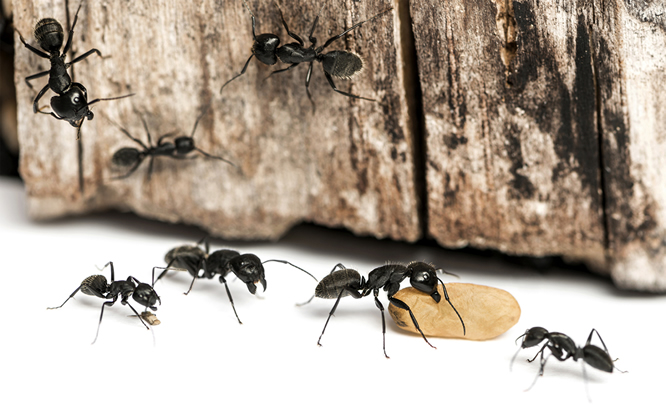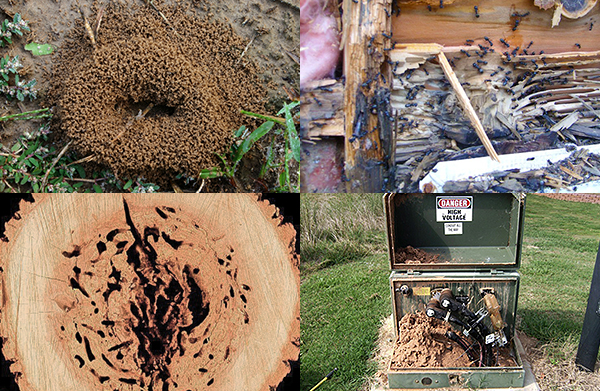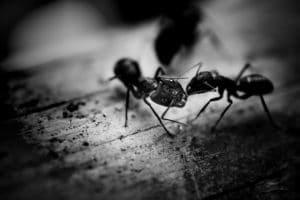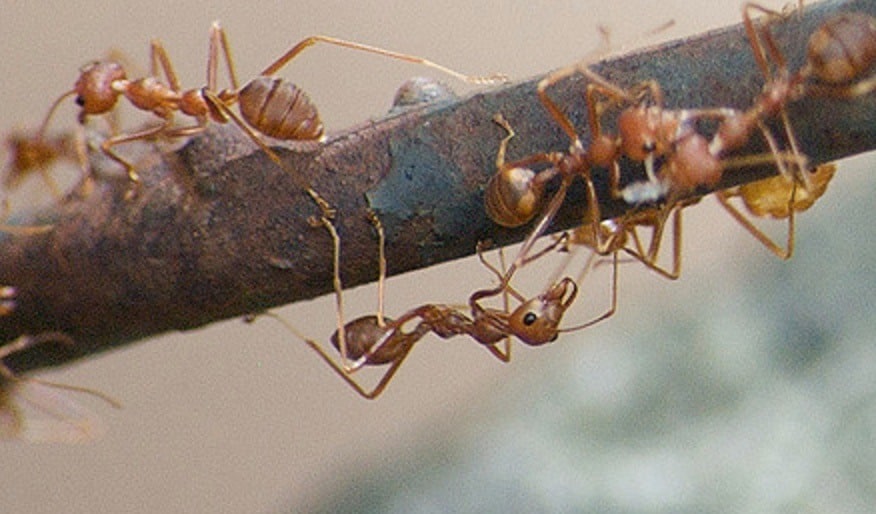HOW TO FIND AN ANT NEST
CAN YOU FOLLOW ANTS BACK TO THEIR NEST?
Trailing ants back to their nest is possible, but it can be very difficult. Ants are often hard to track due to their size and ability to sneak into spaces were humans cannot. Still, if you have patience and determination, you can try following the ants you see. With luck, they will take you back to their nest site.
However, you should be aware that ants rarely walk in a straight line from a food source to their colony site. Instead, many ants walk a zigzag pattern — the result of previous ant-explorers searching for something to help feed the colony. Those scouts laid down a pheromone trail for other ants to follow. Since these trails often meander, it can take an ant a long time to cross even a short distance.
HOW TO FIND AN ANT NEST INDOORS
Tracking ants to a nest inside your house is very important. You want to address these house ants as soon as possible to eliminate the colony that could be damaging your structure and polluting your food and water.
THREE GREAT WAYS FOR BATTLING ANTS INSIDE THE HOUSE
ant nest dustIf you have ants inside your house, TERRO® offers several great options for controlling these bugs.

Ant Inspection Guide
Where to Inspect Indoors
Most ant species prefer moist areas to nest and hide eggs. Typically kitchens and bathrooms are the first rooms to be infested. Use your flashlight to look for ants behind or under refrigerators, stoves, microwaves, dishwashers, sinks, and cabinets. Ants may also be found in or around floor drains, inside the motor areas of refrigerators and microwaves, behind wall paper and in cracks and crevices in cabinets and around walls.
Where to Inspect Outdoors
Ants are opportunistic by nature and can make a nest just about anywhere depending on the species of ant. When inspecting for ants outdoors you should look.
- In firewood piles
- Under yard debris
- In electrical and utility boxes
- In dirt mounds in the yard
- Under the siding on your structure

Tips for Eliminating and Preventing Ant Infestations in the House
Seal Entry Points
Ants are tiny creatures and can enter homes and buildings through minute cracks and crevices. To minimize this, seal around windows and doors and all cable, pipe, and wire entry points. Regularly inspect foundations for tiny cracks through which ants can gain entry to your home.
Keep It Clean
Sanitation is critical for the prevention and control of any pest. Like all living creatures, ants need water, food, and shelter for survival. Ants leave the shelter of their colony to find food and water. Don’t make it easy for them! Keep foods sealed, floors swept, and all surfaces cleaned. Be especially careful to keep things clean while you are targeting the nest, as this will make the sweet ant bait the only thing available to the ants. But don’t clean away the ant trails until you have eliminated the infestation, as these trails will allow the ants to find your bait and carry it back to the nest. Once the infestation has been eradicated, then clean up the trail surfaces and keep them clean.
Use Spray Pesticides Outdoors—Carefully
If you happen to follow ant trails and identify an outdoor nest for the colony, then it may make sense to apply a heavy dose of liquid pesticide that can soak down to reach the queen. Drenching the nest with an approved insecticide spray (following all label directions) can be effective. Make sure, however, to verify that this is the colony creating your indoor infestation problem. Many types of ants are helpful garden creatures that you have no reason to kill. And be aware that these pesticides are likely to be toxic to all insects, including beneficial ones, so apply them carefully according to label directions.
Be Patient
The worker ants will carry the pesticide bait back to the nest, but it can take several days to eliminate the colony, or even a few weeks if the colony is very large or it has several queens, as some ant species do. You may even need to replace the bait station if the ants empty it. Gradually, though, you will see an end to the infestation.
Use Ant Bait Indoors
Avoid the temptation to simply use pesticides to spray visible ants marching along trails in your home. Pesticide sprays can eliminate a few visible ants, but more will quickly replace them, and you’ll never make real progress to eliminating the infestation. Instead, use these worker ants as the ticket into the colony by placing ant bait for them to carry back to the hidden nest.

How to Get Rid of Ants
Keep ants out of your yard.
Yes, this is very tough to do, but there are pesticides (again, available at your local hardware store) that you can apply to your lawn on a regular basis that will help keep ants at bay. It also helps to keep your grass cut short during growth months so that you can see the appearance of any new hills as fast as possible.
Get rid of easy access to your home.
Now that you’ve gotten rid of all the culprits, you need to focus on keeping them away for good. While you have already put out repellant on the ground you need to make sure that you also discourage any other methods for the ant to get across the yard and onto the house, thus avoiding the stuff they hate on the ground. The way to do this is make sure there are no plants, trees or, undergrowth touching the house. Trim any such contact back and try to keep a 6-inch clearance space between soil and your foundation. Also, remove any standing log piles or any other inviting piles of organic matter from within close reach of the house. You’ll also want to seal any cracks and crevices with caulk.
Fire ants.
These insects, known as red imported fire ants (RIFAs) are aggressive and will dose out a painful round of bites (multiples) to anyone that disturbs their nest. They are also an unfortunate way of life in Georgia. The best way to remove them is to apply a heavy concentration of fire ant bait purchased from a local hardware store. The best time to apply bait is in early spring when ants begin to form new colonies and again in the fall. Give your entire lawn a treatment. If any mounds survive then give them a heavier dose – but not directly on the mound, sprinkle it uniformly in a 3-4 foot circle around the mound.
Destroy outside ant colonies.
If it’s not carpenter ants, the colony spawning the invaders is likely outside. Check your lawn, but also be wary of loose bricks or siding on your house. If you find ants watch their movements and follow them to the nest. Once you discover it use insecticide to destroy the colony. You may also pour boiling water (3 quarts or more) over any hills and then, once it has dried, pour another mixture of orange rinds and water onto the hill. A mixture of liquid dish soap and water will also kill ants.
Find indoor ant nests.
If you have carpenter ants, you cannot just feed them bait and have them carry it back to the nest and the queen. They don’t behave that way. So, you will have to locate the nest and deal with the critters there. Carpenter ants tunnel through wood and can do serious damage to your home. They generally like damp areas, so be wary of any spots in your home afflicted by leaks, including framing and flooring. If you cannot find the area easily call an expert that can devote all of his time to locating the culprits. If you do find the colony, douse it with an insecticide that contains bifenthrin, permethrin or deltamethrin. Be careful with these chemicals, or if you’d prefer, call a professional.

How To Get Rid of Ants
If You Can’t Stop The Them, Are Ants In The House Harmful?
Ants tend to be harmless in your home. They don’t carry disease like other pests, but they are very persistent creatures. Most ants that you find in your home are mostly just a nuisance and aesthetically displeasing, if anything.
“People spend a lot of money on year-round pesticides,” says Deborah M. Gordon, associate professor of biological sciences and lead author of the study published about ant infestation by Stanford researchers, “but it’s not the pesticide that keeps ants out of your home, it’s the weather.”
If you find ants in your home, don’t worry! Most people will find ants in their home at some time or another. Controlling your ant problem in your home is your best bet, and using a combination of the above techniques during the peak ant infestation months will help to keep your ant problem under control.
How do I get rid of ants permanently? Is it possible?
I would say that it is relatively impossible to permanently stop ants from coming into your home.
It’s important to know that once ants get into your home, they won’t go away on their own. You’ll have to hire a professional to take care of the ant problem or you’ll have to learn to get rid of ants yourself.